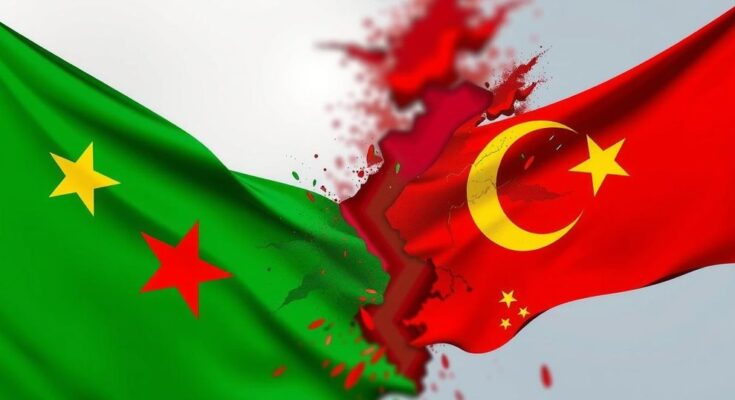Ankara mediates between Somalia and Ethiopia to resolve tensions stemming from a MoU signed between Somaliland and Ethiopia. Türkiye’s longstanding relationships with both nations, along with its contributions to peace in the region, enable its role as a mediator. However, challenges persist due to entrenched positions on national security and Ethiopia’s military ambitions. The Ankara process seeks to navigate these complexities and promote regional stability amidst ongoing conflicts.
Ankara’s diplomatic endeavors between Somalia and Ethiopia represent a critical effort to resolve the ongoing tensions following the January 2024 Memorandum of Understanding (MoU) signed between Somaliland and Ethiopia. Türkiye, with its established diplomatic relations with both nations, positions itself as a credible mediator. It has historically supported peace and stability in the Horn of Africa by significantly investing in Somalia’s state-building and bolstering its military against threats such as al-Shabab. Furthermore, Turkey’s support to Ethiopian Prime Minister Abiy Ahmed in the ongoing conflict against Tigray People’s Liberation Front (TPLF) reflects its strategic involvement in regional dynamics. In the recent round of negotiations, Turkish Foreign Minister Hakan Fidan conveyed Türkiye’s commitment to resolving issues beneficially for both Somalia and Ethiopia, stating, “As Türkiye, our goal is to address the existing concerns and resolve the issues in a way that will benefit not only Somalia and Ethiopia but the entire region.” However, the path to resolving the maritime dispute remains riddled with complexities due to deeply entrenched positions on national security and territorial integrity from both sides. The rivalry for influence in the Horn of Africa is further complicated by the increasing involvement of external actors with strategic interests in the region, as noted by scholar Tunç Demirtaş. Given the historical volatility and political intricacies of the Horn of Africa, the Ankara negotiations symbolize hope for de-escalation. Nevertheless, they also face daunting challenges, particularly in light of Ethiopia’s recent conflicts, including the war in the Tigray region and current unrest in Amhara, alongside the tensions triggered by the Somaliland-Ethiopia MoU. Abiy Ahmed’s rise to power was initially heralded as a transformative moment for Ethiopia, yet the ensuing political turbulence revealed the country’s fragility, characterized by multiple ethnic factions vying for power. Scholar Saskia Brechenmacher referenced this turbulent dynamic, describing it as “a history of repression.” Ethiopia’s pursuit of a naval base in the strategic waters of Bab-el-Mandeb, driven by Abiy’s vision for national greatness amid internal strife and external competition, has exacerbated tensions with Somalia. This ambition poses existential challenges to Somalia, which remains militarily and politically vulnerable. The Somali government, under President Hassan Sheikh Mohamud, has responded delicately to what many perceive as Ethiopia’s imperialistic expansionism. The significance of the MoU lies in its potential implications for Somalia’s sovereignty, making the situation precarious and requiring Türkiye to navigate this landscape with care. To address the complexities of the Somalia-Ethiopia conflict, Türkiye must adopt a balanced diplomatic strategy. Ethiopia’s desire for maritime access must be reconciled with Somalia’s territorial integrity claims. Any confrontation would not only destabilize both nations but could also draw in regional players like Eritrea and Egypt, precipitating broader unrest. In considering international law and relevant norms, obstacles regarding Ethiopia’s military ambitions in Somalia further complicate the mediation process. In conclusion, while Türkiye remains committed to resolving the Somalia-Ethiopia dispute through diplomatic channels, it must adeptly maneuver through geopolitical and legal challenges. The success of the Ankara process hinges on finding a peaceful agreement that addresses the legitimate concerns of both nations and contributes to lasting stability in the Horn of Africa.
The article addresses the mediation efforts by Türkiye aimed at resolving diplomatic tensions between Somalia and Ethiopia, arising from the January 2024 MoU signed between the breakaway Somaliland region and Ethiopia. The historical and political context surrounding these nations highlights the complexities of their relationship and the implications of Ethiopia’s naval aspirations on Somalia’s sovereignty. Türkiye’s role as a mediator is further emphasized by its established diplomatic relations and past contributions to peace and state-building efforts in Somalia, amidst ongoing conflicts in the region.
The uncertainty and strain in the Somalia-Ethiopia relationship demand thoughtful negotiations that consider the intricacies of national sovereignty, territorial claims, and regional stability. Türkiye’s engagement holds the potential to mitigate tensions and foster a collaborative approach to addressing their challenges. However, the complexities of ethnic dynamics, historical grievances, and external influences necessitate a cautious strategy from Türkiye to realize constructive outcomes from the Ankara process.
Original Source: www.dailysabah.com




